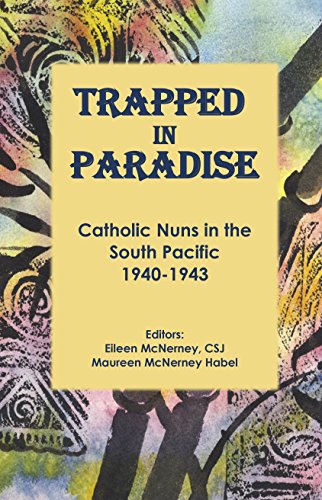Trapped In Paradise: Catholic Nuns in the South Pacific 1940-1943
In Trapped in Paradise, during World War II, four Catholic nuns from California were caught behind enemy lines in the South Pacific. Two of these Sisters of St. Joseph of Orange were teachers and two were nurses. Having arrived In the Solomon Islands in December, 1940, they were new to missionary life, new to a culture not their own, new to the languages spoken on their island and new to navigating in the geography that surrounded them.
On December 7, 1941, a year and a day after the nuns arrived in the Solomons, Japan attacked Pearl Harbor. After that devastating air-strike, the Japanese quickly and strategically occupied many of the islands of the South Pacific. What the nuns didn’t know was that the Japanese wanted to occupy their island, Buka, and they wanted it fast! Buka, a small island just north of the large island of Bougainville, offered the Japanese a strategic site for an airfield to support their invasion of the rest of the South Pacific, including Australia.
When the nuns had left Wilmington, California in 1940, one of them, Sister Hedda Jaeger, a nurse, was tasked with keeping a journal that was sent back periodically to their religious community in Orange, California. In good times and bad, Sister Hedda was faithful to recording their story.
This first person account documents their journey—from their eager anticipation about their new mission, to adapting to the realities of native culture, to sheer terror as they run from the invading Japanese. Once in hiding on the larger island of Bougainville, they learn that other missionaries in the Solomons had been tortured and executed. Throughout their adventures and later ordeals, they are protected by the Marist priests, experienced missionaries who knew the lay of the land and feared for the sisters’ fate should they be captured. After many months of hiding in the jungle and with no communication with the larger world, the sisters were ultimately rescued by United States submarine Nautilus in a high risk mission on New Year’s Day 1943.
The book tells the story of these four courageous and devoted women, the natives they taught and nursed, the priests who hid and protected them, and the incredible physical, emotional, and spiritual challenges they faced. After the end of the war, the Sisters of St. Joseph returned again to serve the people of the Solomon Islands. An epilogue describes the fate of the principal missionaries, both those who survived and those who died at the hands of the Japanese.
The sisters’ journal, related writings, maps, and original photographs form the basis for
this book.













